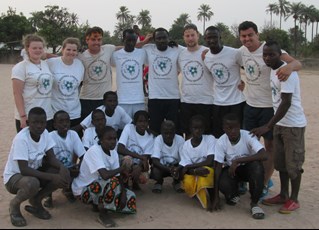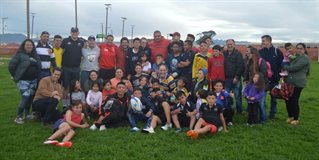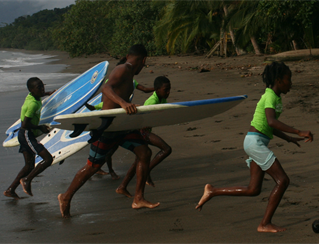International uptake for football in the promotion of peaceful co-existence
The growth of Football 4 Peace has seen the model of sport or football for peace and peaceful co-existence adapting to specific communities. Football 4 Peace Gambia has succeeded in bringing together youth from different communities and ethnic groups, giving leadership roles to men and women from previously marginalised ethnic groups, thus challenging the assumed power of the Mandinka. In Colombia, meanwhile Football 4 Peace training is helping the Fundación Buen Punto to build stakeholder capacity for developing more socially just forms of inclusion, transforming the lives of some of those children who may otherwise become entangled in the gang culture that pervades.
Football 4 Peace has also engaged with humanitarian development in North Korea, bringing together people with conflict-based differences, training male and female coaches, and stimulating inter-cultural understanding across the Korean Peninsula. School-partnered Football 4 Peace Korea undertook new projects in the light of COVID-based restrictions including expanding the University of Brighton's coaching manual to include detailed game lesson plans and specimen values-related questions, and developing a values-related peace education video provided to schools as a teaching aid for remote learning.
The initiative has changed the policies of sporting organisations and was, for example, officially recognised by the Ministry of Culture and Sport in Israel in 2019. It has shaped political discourse, too, contributing to debate on the security and defence agenda at NATO, in the context of cultural relations, conflict prevention and resolution.
Mentoring is a key feature of the Football 4 Peace model with the team at the University of Brighton building partnerships overseas, on home turf and in training others to take the concept further. Student coaches, local volunteers and community leaders all gain valuable leadership skills and ensure that the programme is resilient and sustainable. Football 4 Peace not only works with conflict-torn communities, but also addresses issues such as homophobia and racism in sport. Children, coaches, parents and local political leaders all benefit from being involved in integrated, friendly matches, while illustrating the fair-play values approach through football camps, festivals and ongoing inter-community activities.
The Football 4 Peace programme is a successful example of transferring research into practice to effect change, facilitating the participation of over 8,000 children, 600 coaches and many community leaders while challenging and informing policies of sporting organisations in Israel, Jordan, Palestine, Ireland, South Africa and South Korea.
To contact us and find out more, visit the Football 4 Peace website.
See the Football 4 Peace introductory documentary on YouTube.
Football 4 Peace is a registered trade mark of the University of Brighton.

Football4Peace coaches in The Gambia (above)


Projects in Mosquera and Choco, Colombia, bring football, rugby and surfing projects to cross-community groups in the promotion of co-existence through sport.